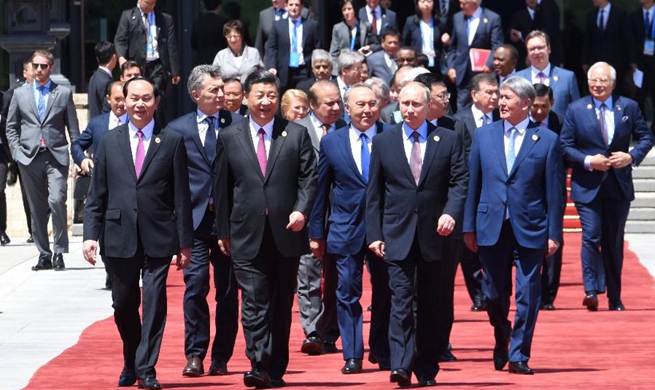NEW YORK, Jan. 12 (Xinhua) -- Even though the whole U.S. economy may get a lift by the country's biggest tax overhaul in three decades, the middle class won't benefit as much as expected from the cut, an expert said Thursday here.
"I just don't think it's going to be a middle tax cut, and as a result that can be another thing that can show up in these inequality statistics that I expect to see in the next 1, 3, or 5 years going forward," Erik Hurst, a professor of economics at Chicago Booth, said at the event of the University of Chicago Booth School of Business' Economic Outlook 2018.
When signing the tax cut bill into law in late December, U.S. President Donald Trump called it "a bill for the middle class and a bill for jobs."
However, its effects on wages of the middle class and the bottom distribution will probably be small at best.
According to Hurst's conjecture, on the personal side the tax cut will make a reduction about 500 U.S. dollars a year for the median worker.
"That's about 10 dollars a week, and at the top part of the distribution, that is about 15,000 dollars a year," said Hurst, a macroeconomist focusing on housing markets, labor markets and household financial behavior.
On the corporate side, many analysts believe that after cutting the corporate income tax rate to 21 percent from 35 percent, companies would invest more in the country and create more jobs.
Hurst holds doubts on this prediction. "What we know now is the firms are sitting on a tremendous amount of cash as it is, which tells me that there's not a lot of production options for this big amount of cash," he noted.
"So I don't expect a lot of it to get reallocated to the investment sector as much as we would have predicted in our models," he added.
Even if companies decide to invest with the saving money by tax cut, they might invest in a way that could result in some of these capital investments on the part of firms that are going to be more substitutable with workers.
"A lot of that is not designed to increase the productivity of middle and low skilled workers, it's to replace productivity in middle and low skilled workers, and in that dimension we're not going to see much of an effect on the wages of the middle class," Hurst pointed out.
Meanwhile, the tax cut is going to have a big effect on deficits, and the government usually responds to deficits by cutting spending, which probably will make the middle class suffer the most.
According to estimates by the nonpartisan Joint Committee on Taxation, the tax bill is expected to add 1.46 trillion dollars to federal deficits over the next 10 years.
"The disproportion of the facts will usually end closer to the middle and bottom part of the distribution than the top of the distribution," said the professor.
"It (the tax cut) is going to have a big effect on inequality both in the short and in the long run," said Hurst. "It was centered on tax cut for the top of the distribution, more so for the middle of the distribution."

















